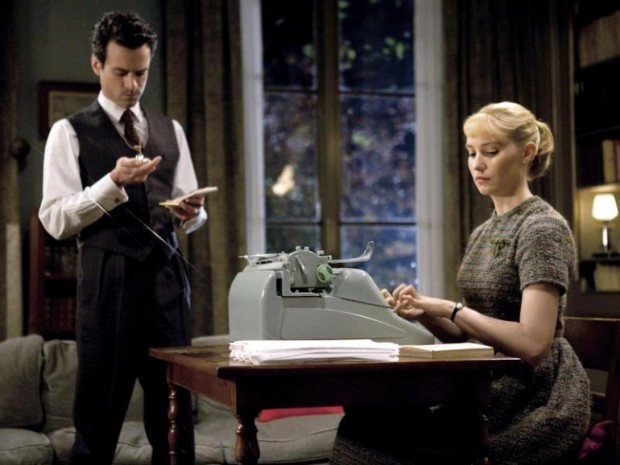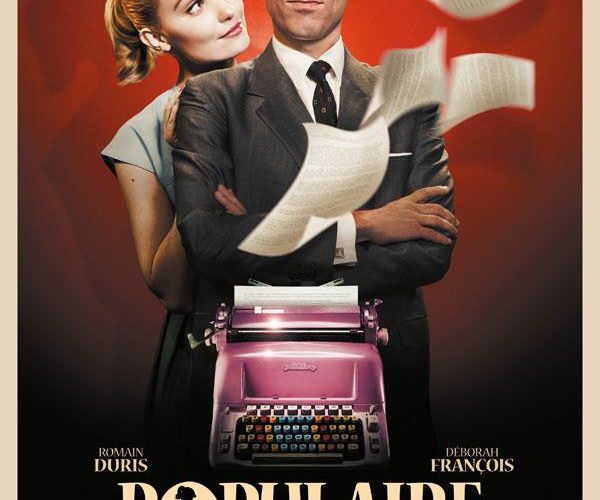Régis Roinsard’s Populaire is being marketed as a romantic comedy, and so it is, but it’s also a buddy comedy of sorts, featuring a girl and her trusty typewriter.
As colorful and perky as its tenacious blonde protagonist, Populaire is a sumptuously crafted and cheerful event likely to beguile the same audiences who adored Michel Hazanavicius’ The Artist. If there’s nothing particularly new or fresh in the film’s story of a 1950’s secretary discovering her modern woman by entering a speed-typing competition, the familiarity is easily overlooked thanks to Roinsard’s quirky, energetic telling and the chemistry of Romain Duris and Déborah François as the two leads. In a flourish that deftly increases the tale’s appeal, the director conjures a vision of the 1950’s inspired by Doris Day, Alfred Hitchcock and Douglas Sirk, with all the melodrama and high-style those names imply.
Written by Roinsard, Daniel Presley and Romain Compingt, the script follows an easily-guessed formula that finds Francois’ Rose, an enterprising young woman from the country, taking a secretary position for the suave, older Luis, who takes a bit to warm to her and ultimately hires her because of her typing skills. This has less to do with efficiency in the workplace and more with Luis’ own competitive spirit; he sends Rose off to compete in official speed-typing competitions. As she wins and graduates from regionals to nationals, he insists she move in so he can help her train in speed and accuracy, strictly for typing of course. The obvious romantic angle that transpires as the two form a partnership to sweep the competition is made slightly more interesting by the involvement of side players like Bérénice Bejo as Luis’ old girlfriend, and Shaun Benson as her American husband.

The concept of a modern woman has obviously been calibrated in Populaire to accommodate the time-period, but because the film incorporates the story’s values directly into its make-up, there’s an oddly dated feel to the scope of its protagonist’s struggles. For Rose, winning Luis’ affection and being the best darn typist around feature as the pinnacle of achievement and the film never suggests she ask for more; Bejo’s progressive mommy might actually be the boldest female character in the cast, but she’s held at bay most of the time. Unlike Mad Men, that uses fastidious period detail to emphasize and internalize the hardships and compromises the fairer sex must make to exist and succeed in this kind of world, Populaire remains fairly breezy with its accomplished production values and opts for a cotton-candy lightness that dismisses any real insight into that side of things.
Roinsard distracts from that perceivable slightness with the typing competitions themselves, which are imagined with a zesty kind of comic automation, the carriage return levers acting as our indicators as to whom is ahead or behind. Expertly composed tracking shots and spinning cameras create a visual kinship with the players of pinball machines, and clever editing recreates the mind-set of the participants, locked in a world of rapid-fire processing. Miraculously, the movie achieves the same kind of investment one would get from similarly plotted sports dramas, caught-up in the tournaments despite the fact they are essentially just a room full of gals punching keys.

Light and airy comedies like Populaire are much harder to get right than they look, and when they succeed we easily dismiss them as pleasant diversions. While I suspect that Roinsard and his stars would be little distressed by such assertions, they deserve real credit for all that they get right. This is, like the films it wants to emulate, primarily a vehicle for performers who are stars first and actors and actresses second. The rewarding thing about Populaire is that Francois is instinctively both. She’s channeled Rose’s naivety and determination with a remarkable wholeness, all the way down to the idiosyncratic gestures she makes when prepping for competition in front of the typewriter. Beyond that she understands her own natural, bubbly charms and how they fit into her romance with Louis and in the larger drama Roinsard has built for her. Duris, who makes a fine and brash romantic foil for her, has a sneaky way of highlighting her charisma through his own occasional showboating.
Roinsard wraps both his leads and supporting cast in the lavish, art-deco delight of his sets and costumes, and in doing so gives his film the warm glow of comforting nostalgia. Although it may be hard to differentiate at times, this reverie isn’t aching for the lost time period, but for the vanished brand of entertainment it represents. Populaire may not be the most nuanced comedy of the year, but it does represent that kind of movie many discerning adults will seek out for relief from a summer full of boisterous event cinema. There’s nothing breathtakingly new about it, but if you have the ability to value a film that treats a girl striving for victory in a typing contest with the same admiration one might reserve for saving the galaxy, then Populaire just might be for you.
Populaire is now in limited release.

